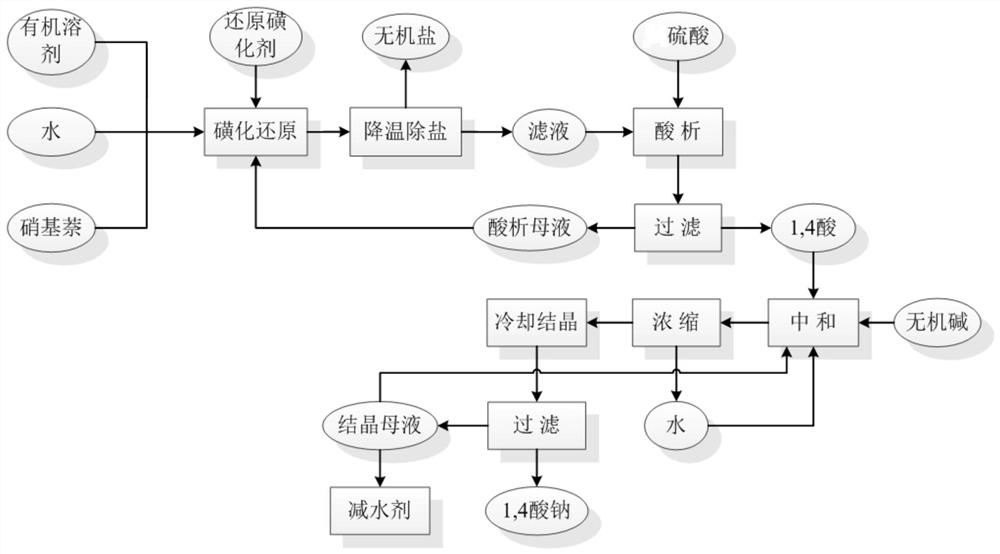A kind of method for preparing 1-amino-4-naphthalene sulfonate sodium
A technology of sodium naphthalene sulfonate and amino group is applied in the field of preparing sodium 1-amino-4-naphthalene sulfonate, which can solve the problems of high sulfonation reaction temperature, cumbersome process route, easy carbonization of products, etc. Product yield, the effect of reducing safety hazards
- Summary
- Abstract
- Description
- Claims
- Application Information
AI Technical Summary
Problems solved by technology
Method used
Image
Examples
Embodiment 1
[0029] A method for preparing sodium 1-amino-4-naphthalenesulfonate, implemented according to the following steps:
[0030] (1) reduction sulfonation reaction: add bottom water 60g in reactor, then add N-N dimethylacetamide 60g, ethylene glycol 60g, 1-nitronaphthalene 17.3g, 16.42g sodium bisulfite successively, heat up to Reflux reaction at 108-114°C, and then add 4.47g of sodium bisulfite every 1h for a total of 5 times. After the feeding of sodium bisulfite is completed, react for 1h to the end of the reaction;
[0031] (2) Desalination: cool the material obtained in step (1) to 5°C, precipitate inorganic salts, then suction or pressure filter, collect filtrate 1, and filtrate 1 is used for acidification;
[0032] (3) Material acidification: add the filtrate 1 collected in step (2) into the reactor, heat up to 50-60° C., add 3.3 g of 98% sulfuric acid to adjust the pH of the filtrate to 1-2, then suction or pressure filter to collect the filter cake 2 and filtrate 2, the c...
Embodiment 2
[0036] A method for preparing sodium 1-amino-4-naphthalenesulfonate, implemented according to the following steps:
[0037](1) Reductive sulfonation reaction: Add 240g bottom water to the reactor, then add 120g1-methyl-2-pyrrolidone, 120g ethylene glycol, 69.2g1-nitronaphthalene, 59.38g sodium metabisulfite, and heat up to 108- Reflux reaction at 114°C, and then put in 19.8g of sodium metabisulfite every 1h for a total of 5 times, after the feeding of sodium metabisulfite is completed, react for 1h to the end of the reaction;
[0038] (2) Desalination: cool the material obtained in step (1) to 5°C, precipitate inorganic salts, then suction or pressure filter, collect filtrate 1, and filtrate 1 is used for acidification;
[0039] (3) Material acidification: add the filtrate 1 collected in step (2) into the reactor, heat up to 50-60° C., add 13.4 g of 98% sulfuric acid to adjust the pH of the filtrate to 1-2, then suction or pressure filter to collect the filter cake 2 and filt...
Embodiment 3
[0043] A method for preparing sodium 1-amino-4-naphthalenesulfonate, implemented according to the following steps:
[0044] (1) Reductive sulfonation reaction: add 300g bottom water in the reactor, then add 150gN-N dimethylformamide, 150g ethylene glycol, 86.5g1-nitronaphthalene, 82.1g sodium bisulfite successively, heat up to Reflux reaction at 108-114°C, and then add 27.3g of sodium bisulfite every 1h for a total of 5 times. After the feeding of sodium bisulfite is completed, react for 1h to the end of the reaction;
[0045] (2) Desalination: cool the material obtained in step (1) to 5°C, precipitate inorganic salts, then suction or pressure filter, collect filtrate 1, and filtrate 1 is used for acidification;
[0046] (3) Material acidification: add the filtrate 1 collected in step (2) into the reactor, heat up to 50-60° C., add 16.5 g of 98% sulfuric acid to adjust the pH of the filtrate to 1-2, then suction or pressure filter to collect the filter cake 2 and filtrate 2, ...
PUM
 Login to View More
Login to View More Abstract
Description
Claims
Application Information
 Login to View More
Login to View More - R&D
- Intellectual Property
- Life Sciences
- Materials
- Tech Scout
- Unparalleled Data Quality
- Higher Quality Content
- 60% Fewer Hallucinations
Browse by: Latest US Patents, China's latest patents, Technical Efficacy Thesaurus, Application Domain, Technology Topic, Popular Technical Reports.
© 2025 PatSnap. All rights reserved.Legal|Privacy policy|Modern Slavery Act Transparency Statement|Sitemap|About US| Contact US: help@patsnap.com

